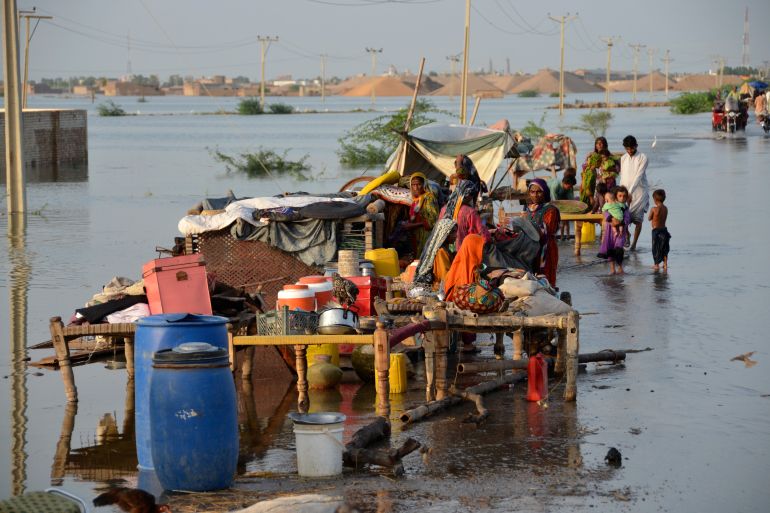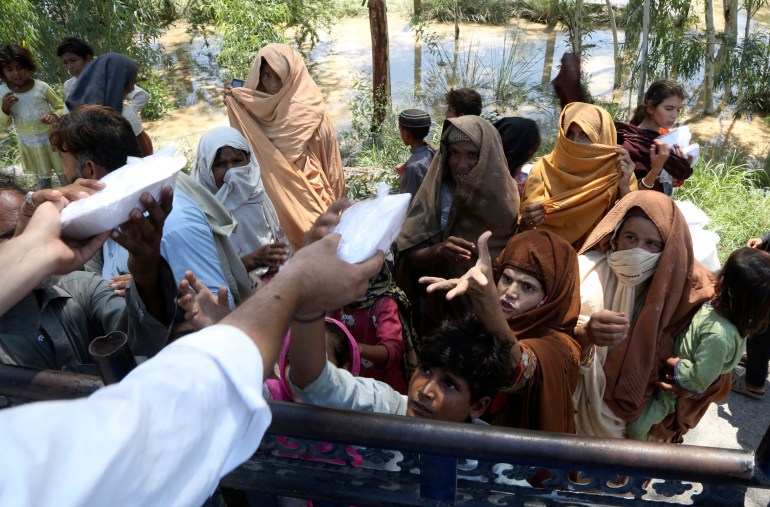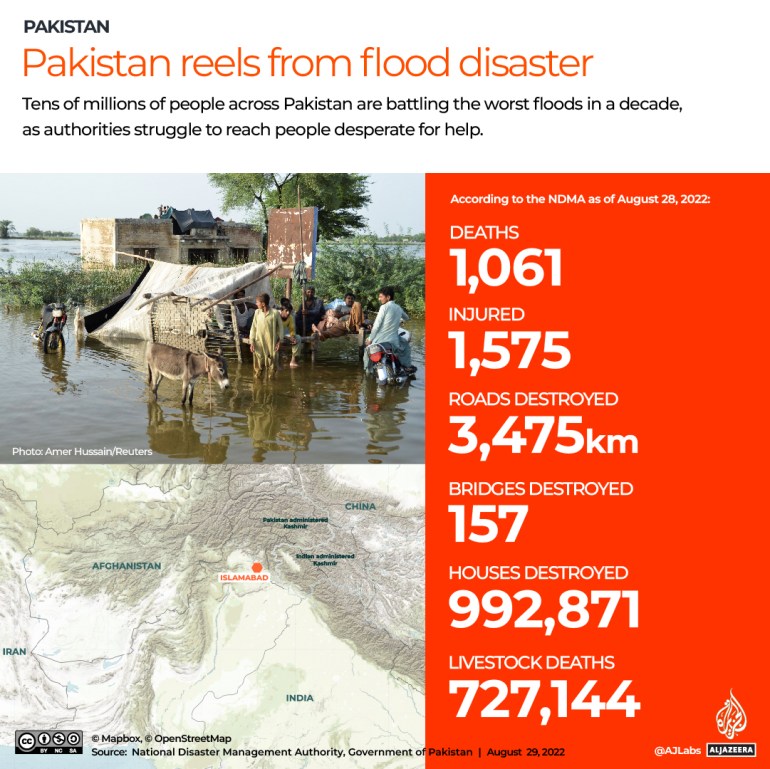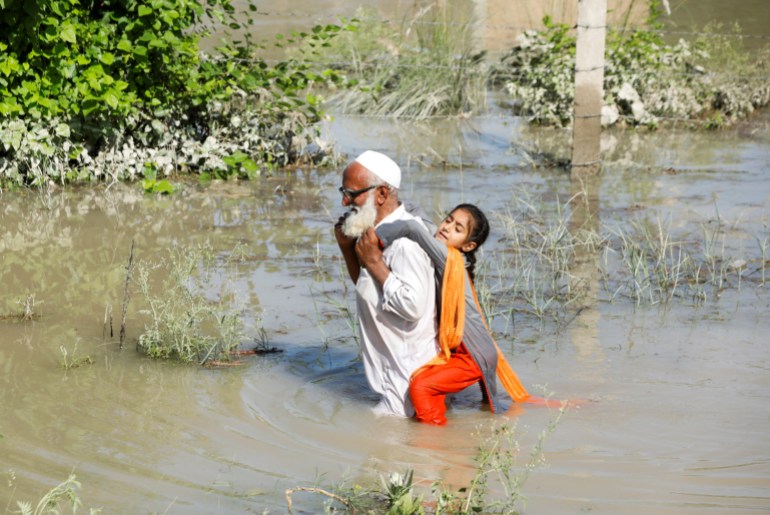Millions in need of aid as ‘unprecedented’ floods hit Pakistan
More than 1,000 people have died in the floods as authorities struggle to provide relief to flood victims.

Millions of Pakistanis affected by the worst flooding in a decade are in desperate need of aid as authorities say they have been “overwhelmed” by the scale of the disaster, with the country’s climate minister calling it a “serious climate catastrophe”.
The death toll from monsoon flooding since June has reached 1,136, according to figures released Monday by the country’s National Disaster Management Authority.
Keep reading
list of 4 itemsPakistan declares national emergency as flood toll nears 1,000
‘Climate catastrophe’: Pakistan flood toll tops 1,000
Photos: Pakistan monsoon flooding death toll tops 1,000
It said 75 people had died in the previous 24 hours, but authorities were still trying to reach cut-off villages in the mountainous north.
The unprecedented monsoon season has affected all four provinces of the country. Nearly a million homes have been destroyed or badly damaged, numerous roads rendered impassable and electricity outages have been widespread, affecting at least 33 million people.
Rasheedan Sodhar had to walk more than 20km (12 miles) to safety after her village in southern Sindh province was submerged by water.
“We are a family of 20, and we were told yesterday [Sunday] to immediately leave the village. We have nothing left. We are alive, but we are not able to live any more,” the 25-year-old teacher told Al Jazeera, adding that she could not save her 30 livestock while her house was destroyed by the deluge.
Sodhar said her entire family, with pregnant women and infants, have no shelter and are living in the open in scorching weather in the nearby town of Mehar. “We barely get one meal a day. Our children are crying all day. What can you tell them to stop crying when there is no home for them,” she said.

Hundreds of thousands of people have been evacuated from flooded areas.
Some 180,000 people have been evacuated from Charsadda and 150,000 from Nowshera district in northwestern Khyber Pakhtunkhwa province, Kamran Bangash, a spokesperson for the provincial government, said.
Many have been forced to take shelter on roadsides.
Khaista Rehman, 55, took shelter with his wife and three children on the side of the Islamabad-Peshawar highway after his home in Charsadda was submerged overnight.
“Thank God, we are safe now on this road quite high from the flooded area,” he told The Associated Press news agency.
“Our crops are gone and our home is destroyed but I am grateful to Allah that we are alive and I will restart life with my sons.”
Aid flights begin arriving
Deaths from widespread flooding in Pakistan have reached 1,061 since mid-June, officials said on Sunday, as Prime Minister Shehbaz Sharif on Sunday announced a $45m relief fund for the flood-hit Balochistan province.
“I saw floodwater everywhere, wherever I went in recent days and even today,” Sharif said on Monday in Charsadda, one of the devastated towns. He said the planes carrying aid from some countries have reached Pakistan as he expected more in the coming days.
Sharif said the government would provide housing to all those who lost their homes.
This is very far from a normal monsoon - it is climate dystopia at our doorstep
The government has declared a national emergency and appealed for international help. On Sunday, the first aid flights arrived from Turkey and the UAE, carrying tents, food and other daily necessities. Qatar Red Crescent has also pledged emergency aid.
Trucks carrying tents, food, and water arranged by Pakistan were also being dispatched to various parts of the country by the National Disaster Management Authority for tens of thousands of flood victims.
The United Nations will launch an international appeal for Pakistani flood victims on Tuesday in Islamabad, the national capital.
Flash flooding from the heavy rains has washed away villages and crops as soldiers and rescue workers evacuated stranded residents to the safety of relief camps and provided food to thousands of displaced Pakistanis.
“What we see now is an ocean of water submerging entire districts,” Climate Minister Sherry Rehman told the AFP news agency on Monday.
“This is very far from a normal monsoon – it is climate dystopia at our doorstep.”
In a video posted on Twitter on Sunday Rehman said Pakistan is experiencing a “serious climate catastrophe, one of the hardest in the decade”.

“We are at the moment at the ground zero of the front line of extreme weather events, in an unrelenting cascade of heatwaves, forest fires, flash floods, multiple glacial lake outbursts, flood events and now the monster monsoon of the decade is wreaking non-stop havoc throughout the country,” she said.
Foreign Minister Bilawal Bhutto Zardari said on Sunday he hoped financial institutions such as the International Monetary Fund would take the economic fallout into account. The South Asian nation has been battling an economic crisis, facing high inflation, a depreciating currency and a current account deficit.
“I haven’t seen destruction of this scale, I find it very difficult to put into words … it is overwhelming,” Zardari said in an interview with the Reuters news agency.
Finance Minister Miftah Ismail earlier told Al Jazeera that the floods have inflicted an estimated “loss of at least $10bn” in the country.

‘All that is finished’
Rehman told Turkish news outlet TRT World that by the time the rains recede, “we could well have one-fourth or one-third of Pakistan under water”.
“This is something that is a global crisis and of course, we will need better planning and sustainable development on the ground … We’ll need to have climate resilient crops as well as structures,” she said.
This year’s floods are comparable to 2010 – the worst on record – when more than 2,000 people died and nearly a fifth of the country was under water.
Much of Sindh is now an endless landscape of water, hampering a relief operation.
“Our crop spanned over 5,000 acres on which the best quality rice was sown and is eaten by you and us,” Khalil Ahmed, 70, told AFP.
“All that is finished.”